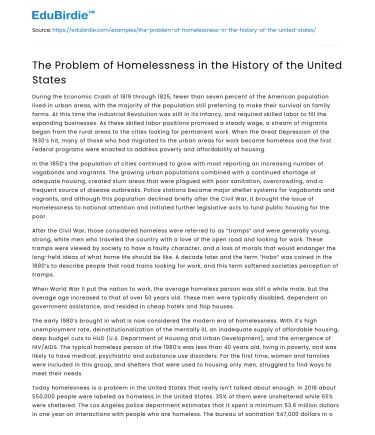During the Economic Crash of 1819 through 1825, fewer than seven percent of the American population lived in urban areas, with the majority of the population still preferring to make their survival on family farms. At this time the Industrial Revolution was still in its infancy, and required skilled labor to fill the expanding businesses. As these skilled labor positions promised a steady wage, a stream of migrants began from the rural areas to the cities looking for permanent work. When the Great Depression of the 1930’s hit, many of those who had migrated to the urban areas for work became homeless and the first Federal programs were enacted to address poverty and affordability of housing.
In the 1850’s the population of cities continued to grow with most reporting an increasing number of vagabonds and vagrants. The growing urban populations combined with a continued shortage of adequate housing, created slum areas that were plagued with poor sanitation, overcrowding, and a frequent source of disease outbreaks. Police stations became major shelter systems for vagabonds and vagrants, and although this population declined briefly after the Civil War, it brought the issue of Homelessness to national attention and initiated further legislative acts to fund public housing for the poor.
Save your time!
We can take care of your essay
- Proper editing and formatting
- Free revision, title page, and bibliography
- Flexible prices and money-back guarantee
After the Civil War, those considered homeless were referred to as “tramps” and were generally young, strong, white men who traveled the country with a love of the open road and looking for work. These tramps were viewed by society to have a faulty character, and a loss of morals that would endanger the long-held ideas of what home life should be like. A decade later and the term “Hobo” was coined in the 1880’s to describe people that road trains looking for work, and this term softened societies perception of tramps.
When World War II put the nation to work, the average homeless person was still a white male, but the average age increased to that of over 50 years old. These men were typically disabled, dependent on government assistance, and resided in cheap hotels and flop houses.
The early 1980’s brought in what is now considered the modern era of homelessness. With it's high unemployment rate, deinstitutionalization of the mentally ill, an inadequate supply of affordable housing, deep budget cuts to HUD (U.S. Department of Housing and Urban Development), and the emergence of HIV/AIDS. The typical homeless person of the 1980’s was less than 40 years old, living in poverty, and was likely to have medical, psychiatric and substance use disorders. For the first time, women and families were included in this group, and shelters that were used to housing only men, struggled to find ways to meet their needs.
Today homelesnees is a problem in the United States that really isn’t talked about enough. In 2018 about 550,000 people were labeled as homeless in the United States. 35% of them were unsheltered while 65% were sheltered. The Los Angeles police department estimates that it spent a minimum 53.6 million dollars in one year on interactions with people who are homeless. The bureau of sanitation 547,000 dollars in one year on the cleaning up of homeless areas. Homelssness is also a big problem in states that get below freezing in the winter as it can do serious damage to a person's body being outside that long. The average homeless person dies at the age of 44, which is about 30 years lower than the average lifespan in the United States of America.
A theory of homelssness was introduced by Karl Marx claiming that society is always in a state of competitiveness because of scare resources. This theory states that power leads to being higher up in social order. Karl Marx also states that capitalism is the main cause of homelessness. He believes this because his theory suggests that there are two classes. One class deprives the other of their basic human needs. He also suggests that people's shortcomings and flaws lead to homelesness.
There are many possible solutions to homlessness. One possible solution is to adequately fund mental health facilities as some homeless people have mental health issues that they can't afford to be treated for. Another possible solution is to establish better reentry programs for criminals who are getting out of prison. Cities with high homelessness rates could also build more affordable housing for families that can not afford normally priced homes. They could also increase public housing in bigger cities or increase the number of shelters so the unsheltered population would have a place to go.
Resources
- Whitehouse.gov. Retrieved 2 November 2019, from https://www.whitehouse.gov/wp-content/uploads/2019/09/The-State-of-Homelessness-in-America.pdf
- V., Aucoin, T., Aucoin, P., brown241, P., Calloway, A., & Calloway, P. et al. (2018). Theories of Homelessness | Chapman Peace Studies Capstone Projects. Sites.chapman.edu. Retrieved 2 November 2019, from https://sites.chapman.edu/capstoneprojectsinpeacestudies/2018/02/15/theories-of-homelessness/
- Solutions - National Alliance to End Homelessness. (2019). National Alliance to End Homelessness. Retrieved 2 November 2019, from https://endhomelessness.org/ending-homelessness/solutions/
- National Academies of Sciences, a., Division, H., Practice, B., Affairs, P., Program, S., & Individuals, C. (2018). The History of Homelessness in the United States. National Academies Press (US). Retrieved from https://www.ncbi.nlm.nih.gov/books/NBK519584/
- Project, A., Project, A., & Project, A. (2019). The Impact of Homelessness on Economic Competitiveness. American Security Project. Retrieved 2 November 2019, from https://www.americansecurityproject.org/impact-homelessness-economic-competitiveness/






 Stuck on your essay?
Stuck on your essay?

